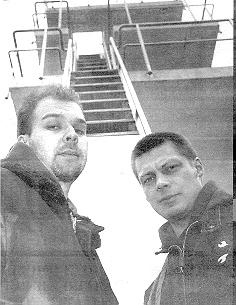THE HEROES OF ANOTHER KIND OF TECHNO -- FROM TURKU
Ilkka Mattila, Helsingin Sanomat, 19 June 1995 (*)
 The reputation of the Down By The Laituri festival (Turku, Finland,
June 15.-17.1995) as the flagbearer of the alternative pop music stands firmly
unaltered on many fronts. Besides the traditional guitar rock and vocals pop,
Laituri ('Pier', Turku being one of the biggest sea ports in Finland) had this
year to offer some music for the friends of ambitious techno and electronic
sounds, too. Something that the people visiting the other Finnish festivals
can't enjoy this summer.
The reputation of the Down By The Laituri festival (Turku, Finland,
June 15.-17.1995) as the flagbearer of the alternative pop music stands firmly
unaltered on many fronts. Besides the traditional guitar rock and vocals pop,
Laituri ('Pier', Turku being one of the biggest sea ports in Finland) had this
year to offer some music for the friends of ambitious techno and electronic
sounds, too. Something that the people visiting the other Finnish festivals
can't enjoy this summer.
The purist instrumental techno is often considered as a specialist hobby of the devoted inside circle, but at the Laituri 'strange' and 'uncommercial' music seemed to interest delightfully heterogenic and multiple audiences.
The Öljy ('Oil') techno club of Laituri started in Thursday with some domestic Finnish DJ artists; in Friday the more heavier industrial sounds were a part of the schedule, and as for the Saturday club, the audience were tempted by two of the Sähkö Recordings' internationally acclaimed artists, the Turku group PANASONIC and the organ man JIMI TENOR.
Panasonic, consisting of Mika 'Ø' Vainio, Ilpo Väisänen and Sami Salo, must be the Sähkö's flagship at the moment, and have during their relatively short career already played in New York, London and Berlin, and have gained some of the world's most reputable techno artists as their fans. It is very typical though, that Down By The Laituri festival was Panasonic's first appearance in their native Finland.
Panasonic has reached the top of the world techno for the reasons that are well understandable. Their sound is easily recognizable and unusual, and as a live act they take techno's visual non-happening to its very limits. The trio won't do any kind of gestures towards traditional playing, won't fiddle with the keyboards of synthesizers and won't even dance to their music. Vainio, Salo and Väisänen just set up their sound laboratory on the stage, taking care of the control voltage, envelope-shapers and waveforms. They don't talk to the audience, barely even recognize its existence.
Together with Panasonic's music the general mood became peculiarly serene.
The central elements of the group's music are the bulky but pleasantly round bass and drum sounds, and on the other hand the aggressive hum of their self-made sound generator. Panasonic uses their straight dance beat sparingly but also effectively. It just was that the pub restaurant working as a club room was not the most suitable place for this experimental techno music. Standing in the wrong place, one could only get one's ears aching.
Panasonic can barely do much to heighten the profile of the Finnish pop music around the world. Still, standing on their own ground they are an absolutely stylish group, and as electronic dance can well be called this decade's most advanced pop music, one can only be proud of the people like Panasonic coming from this distant country.
Panasonic's forthcoming album will be published by Mute Records (UK) on its Blast First label. In addition to the Panasonic noise escapades, Mika Vainio's solo recordings will also be heard all over the world soon.
(*) from Helsingin Sanomat, June 19, 1995 - the translation from Finnish and all ensuing grammatical/stylistical errors my own -ER)
Copyright ©
1995 Helsingin Sanomat